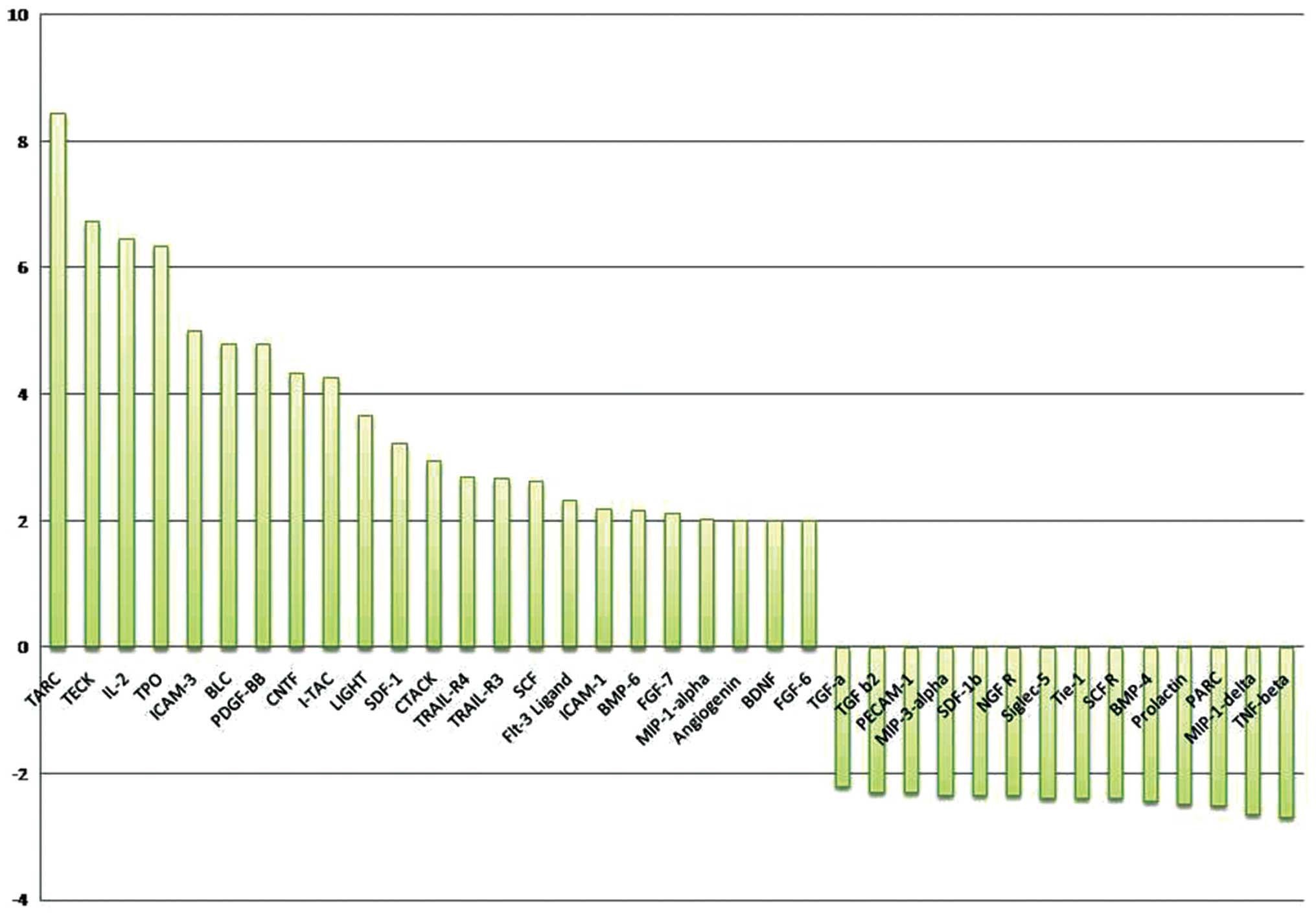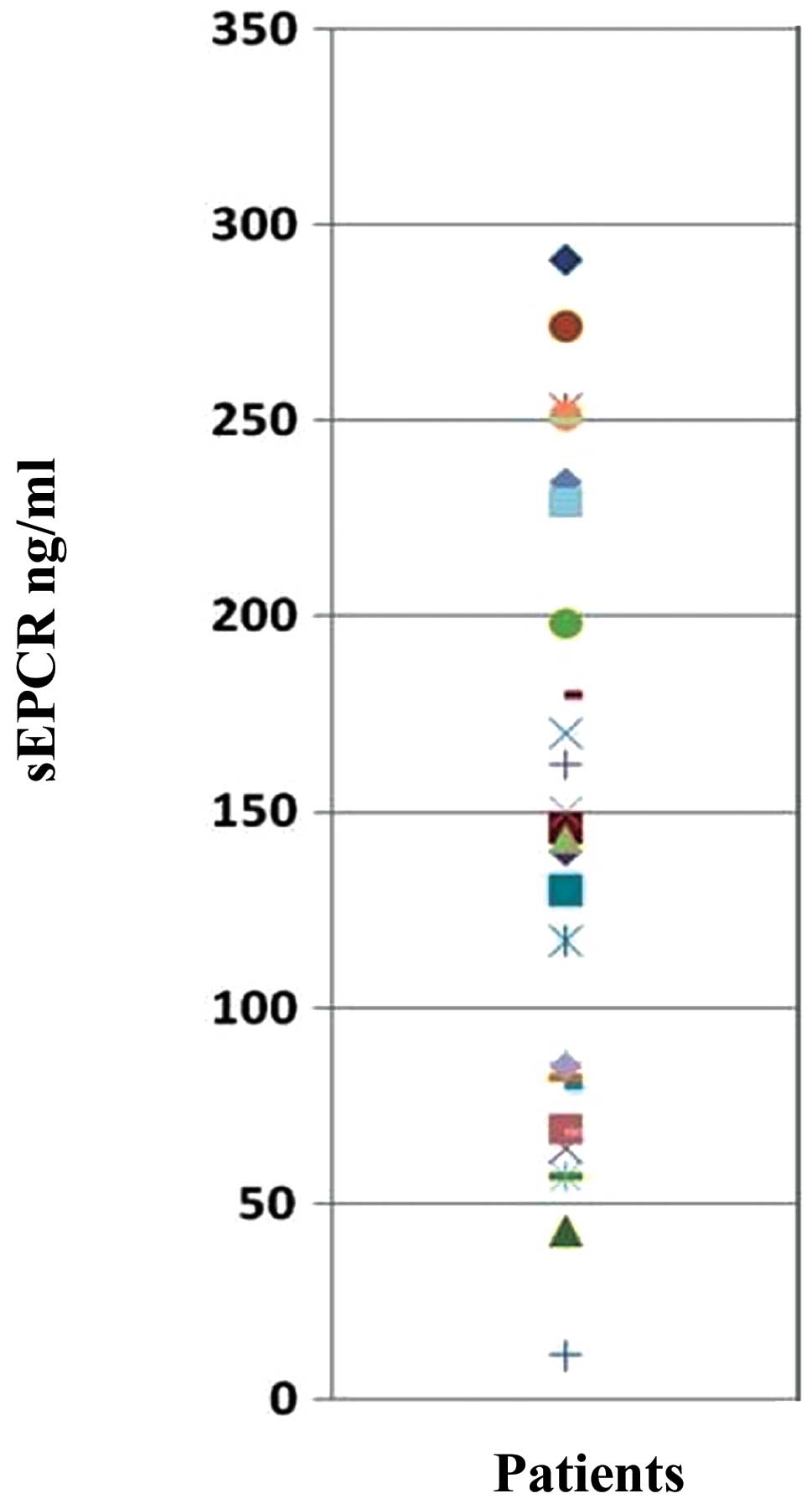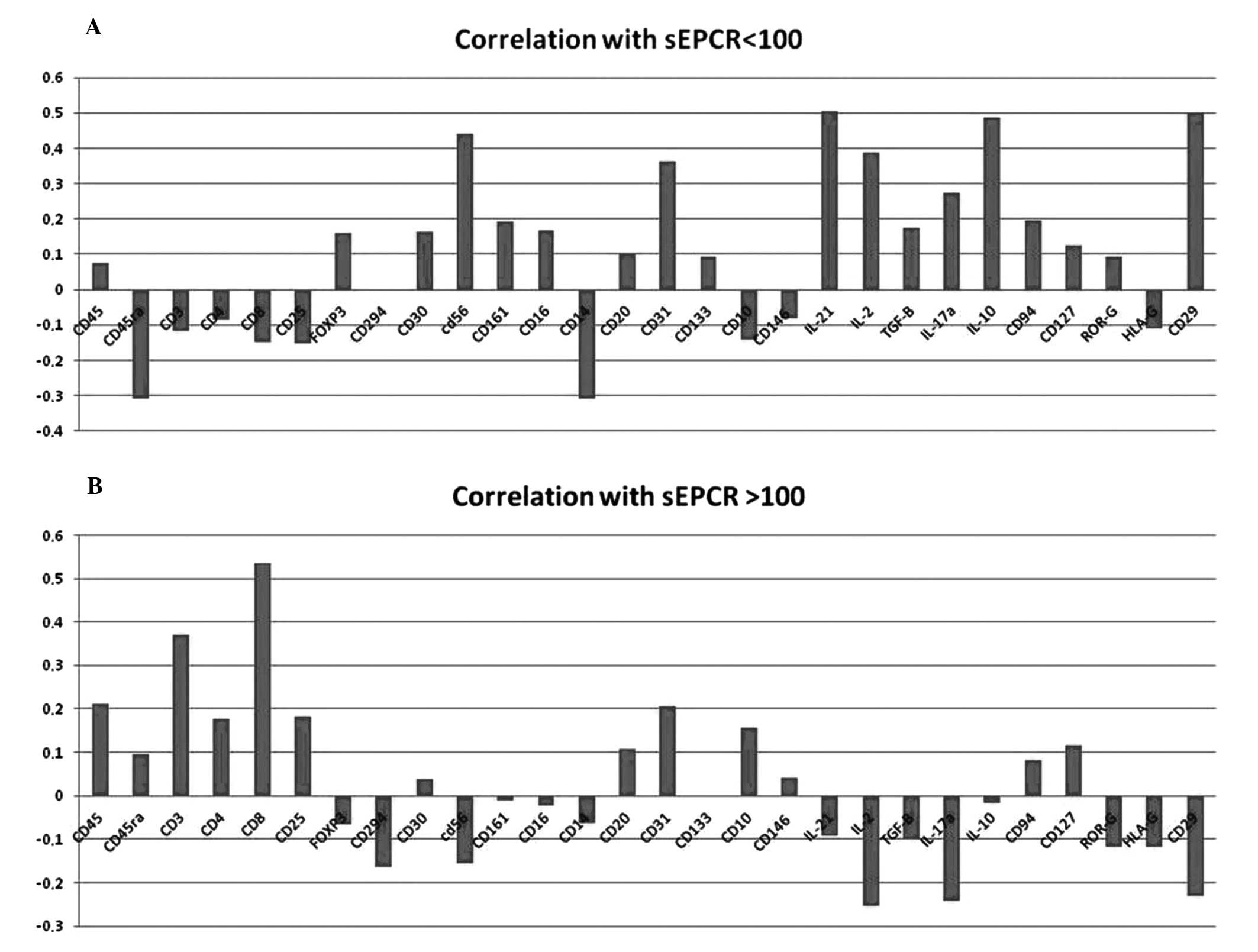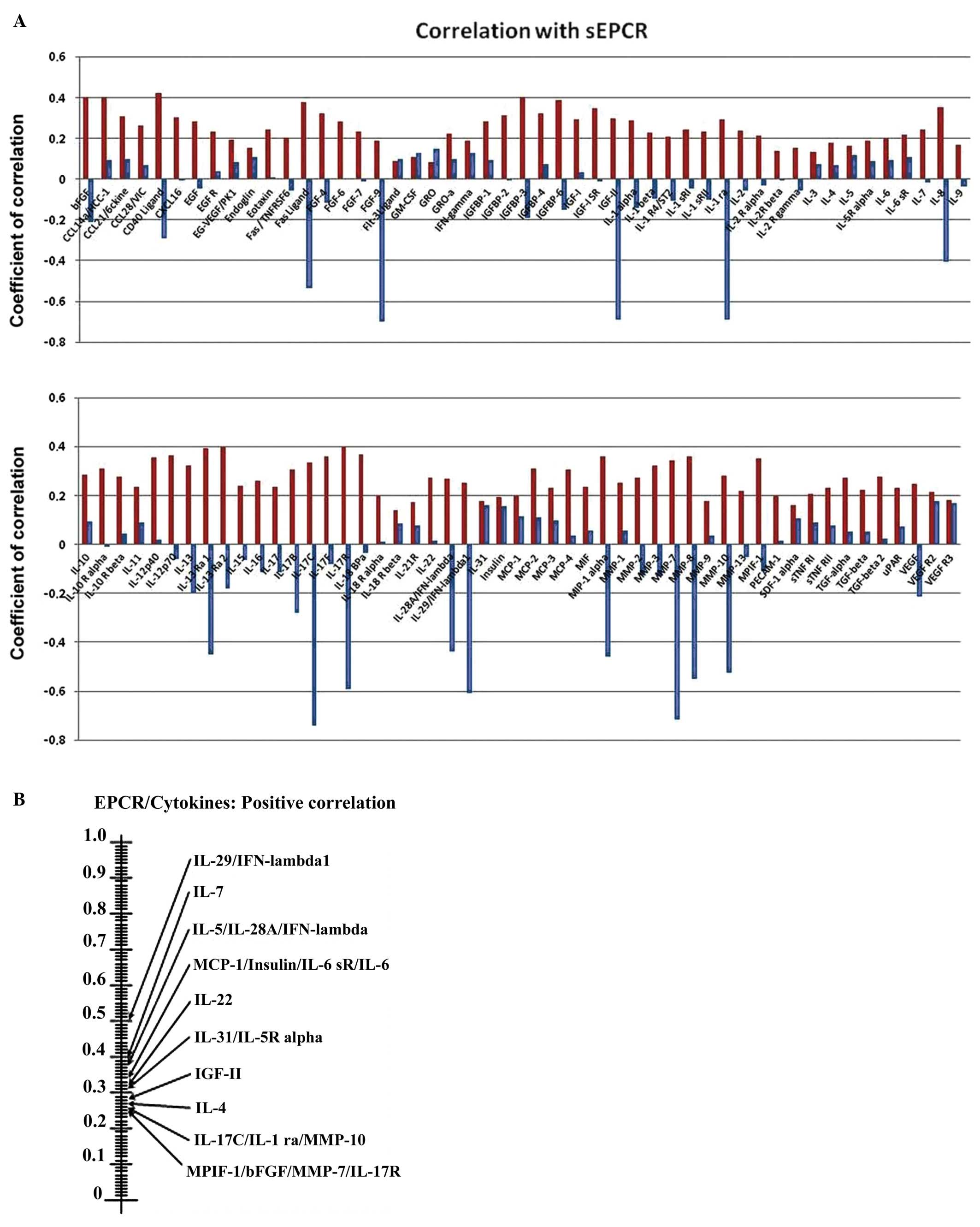|
1.
|
Dahlbäck B and Villoutreix BO: Molecular
recognition in the protein C anticoagulant pathway. J Thromb
Haemost. 1:1525–1534. 2003.
|
|
2.
|
Li W, Zheng X, Gu J, Ferrell GL, Lupu F,
Esmon NL and Esmon CT: Overexpressing endothelial cell protein C
receptor alters the hemostatic balance and protects mice from
endotoxin. J Thromb Haemost. 3:1351–1359. 2005. View Article : Google Scholar : PubMed/NCBI
|
|
3.
|
Taylor FB Jr, Peer GT, Lockhart MS,
Ferrell G and Esmon CT: Endothelial cell protein C receptor plays
an important role in protein C activation in vivo. Blood.
97:1685–1688. 2001. View Article : Google Scholar : PubMed/NCBI
|
|
4.
|
Fukudome K, Kurosawa S, Stearns-Kurosawa
DJ, He X, Rezaie AR and Esmon CT: The endothelial cell protein C
receptor. Cell surface expression and direct ligand binding by the
soluble receptor. J Biol Chem. 271:17491–17498. 1996. View Article : Google Scholar : PubMed/NCBI
|
|
5.
|
Xu J, Qu D, Esmon NL and Esmon CT:
Metalloproteolytic release of endothelial cell protein C receptor.
J Biol Chem. 275:6038–6044. 2000. View Article : Google Scholar : PubMed/NCBI
|
|
6.
|
Fukudome K and Esmon CT: Identification,
cloning, and regulation of a novel endothelial cell protein
C/activated protein C receptor. J Biol Chem. 269:26486–26491.
1994.PubMed/NCBI
|
|
7.
|
Zheng X, Li W, Gu JM, Qu D, Ferrell GL,
Esmon NL and Esmon CT: Effects of membrane and soluble EPCR on the
hemostatic balance and endotoxemia in mice. Blood. 109:1003–1009.
2007. View Article : Google Scholar : PubMed/NCBI
|
|
8.
|
Saposnik B, Lesteven E, Lokajczyk A, Esmon
CT, Aiach M and Gandrille S: Alternative mRNA is favored by the A3
haplotype of the EPCR gene PROCR and generates a novel soluble form
of EPCR in plasma. Blood. 111:3442–3451. 2008. View Article : Google Scholar : PubMed/NCBI
|
|
9.
|
Shorr AF, Janes JM, Artigas A, Tenhunen J,
Wyncoll DL, Mercier E, Francois B, Vincent JL, Vangerow B,
Heiselman D, Leishman AG, Zhu YE and Reinhart K: Randomized trial
evaluating serial protein C levels in severe sepsis patients
treated with variable doses of drotrecogin alfa (activated). Crit
Care. 14:R2292010. View
Article : Google Scholar : PubMed/NCBI
|
|
10.
|
Yan SB, Helterbrand JD, Hartman DL, Wright
TJ and Bernard GR: Protein C levels as a prognostic indicator of
outcome in sepsis and related diseases. Crit Care Med. 28:S49–S56.
2000. View Article : Google Scholar : PubMed/NCBI
|
|
11.
|
Della Valle P, Pavani G and D’Angelo A:
The protein C pathway and sepsis. Thromb Res. 129:296–300.
2012.PubMed/NCBI
|
|
12.
|
Joyce DE, Gelbert L, Ciaccia A, DeHoff B
and Grinnell BW: Gene expression profile of antithrombotic protein
c defines new mechanisms modulating inflammation and apoptosis. J
Biol Chem. 276:11199–11203. 2001. View Article : Google Scholar : PubMed/NCBI
|
|
13.
|
Pereira C, Schaer DJ, Bachli EB, Kurrer MO
and Schoedon G: Wnt5A/CaMKII signaling contributes to the
inflammatory response of macrophages and is a target for the
antiinflammatory action of activated protein C and interleukin-10.
Arterioscler Thromb Vasc Biol. 28:504–510. 2008. View Article : Google Scholar : PubMed/NCBI
|
|
14.
|
Tsuneyoshi N, Fukudome K, Horiguchi S, Ye
X, Matsuzaki M, Toi M, Suzuki K and Kimoto M: Expression and
anticoagulant function of the endothelial cell protein C receptor
(EPCR) in cancer cell lines. Thromb Haemost. 85:356–361.
2001.PubMed/NCBI
|
|
15.
|
Wang X, Wang E, Kavanagh JJ and Freedman
RS: Ovarian cancer, the coagulation pathway, and inflammation. J
Transl Med. 3:25–29. 2005. View Article : Google Scholar : PubMed/NCBI
|
|
16.
|
Scheffer GL, Flens MJ, Hageman S,
Izquierdo MA, Shoemaker RH and Scheper RJ: Expression of the
vascular endothelial cell protein C receptor in epithelial tumour
cells. Eur J Cancer. 38:1535–1542. 2002. View Article : Google Scholar : PubMed/NCBI
|
|
17.
|
Beaulieu LM and Church FC: Activated
protein C promotes breast cancer cell migration through
interactions with EPCR and PAR-1. Exp Cell Res. 313:677–687. 2007.
View Article : Google Scholar : PubMed/NCBI
|
|
18.
|
Ducros E, Mirshahi S, Azzazene D,
Camilleri-Broët S, Mery E, Al Farsi H, Althawadi H, Besbes S,
Chidiac J, Pujade-Lauraine E, Therwath A, Soria J and Mirshahi M:
Endothelial protein C receptor expressed by ovarian cancer cells
can be a biomarker of cancer expansion. Int J Oncol. 41:433–440.
2012.
|
|
19.
|
Ducros E, Mirshahi S, Faussat AM, Mirshahi
P, Dimicoli S, Tang R, Pardo J, Ibrahim J, Marie JP, Therwath A,
Soria J and Mirshahi M: Soluble endothelial protein C receptor
(sEPCR) is a likely as a biomarker of cancer associated
hypercoagulability in human hematologic malignancies. Cancer Med.
1:261–267. 2012. View
Article : Google Scholar
|
|
20.
|
Davidson B, Zhang Z, Kleinberg L, Li M,
Flørenes VA, Wang TL and ShihIe M: Gene expression signatures
differentiate ovarian/peritoneal serous carcinoma from diffuse
malignant peritoneal mesothelioma. Clin Cancer Res. 12:5944–5950.
2006. View Article : Google Scholar
|
|
21.
|
Kioi M, Kawakami M, Shimamura T, Husain SR
and Puri RK: Interleukin-13 receptor alpha2 chain: a potential
biomarker and molecular target forovarian cancer therapy. Cancer.
107:1407–1418. 2006.PubMed/NCBI
|
|
22.
|
Amonkar SD, Bertenshaw GP, Chen TH,
Bergstrom KJ, Zhao J, Seshaiah P, Yip P and Mansfield BC:
Development and preliminary evaluation of a multivariate index
assay for ovarian cancer. PLoS One. 4:e45992009. View Article : Google Scholar : PubMed/NCBI
|
|
23.
|
Kaushansky K: Lineage-specific
hematopoietic growth factors. N Engl J Med. 354:2034–2045. 2006.
View Article : Google Scholar : PubMed/NCBI
|
|
24.
|
Liu YJ, Soumelis V, Watanabe N, Ito T,
Wang YH, Malefyt Rde W, Omori M, Zhou B and Ziegler SF: TSLP: an
epithelial cell cytokine that regulates T cell differentiation by
conditioning dendritic cell maturation. Annu Rev Immunol.
25:193–219. 2007. View Article : Google Scholar : PubMed/NCBI
|
|
25.
|
Johnson EL, Singh R, Singh S,
Johnson-Holiday CM, Grizzle WE, Partridge EE and Lillard JW Jr:
CCL25-CCR9 interaction modulates ovarian cancer cell migration,
metalloproteinase expression, and invasion. World J Surg Oncol.
8:622010. View Article : Google Scholar : PubMed/NCBI
|
|
26.
|
Vergara C and Ramirez B: CNTF, a
pleiotropic cytokine: emphasis on its myotrophic role. Brain Res
Brain Res Rev. 47:161–173. 2004. View Article : Google Scholar : PubMed/NCBI
|
|
27.
|
Simmons DL: The role of ICAM expression in
immunity and disease. Cancer Surv. 24:141–155. 1995.PubMed/NCBI
|
|
28.
|
Kunkel EJ and Butcher EC: Chemokines and
the tissue-specific migration of lymphocytes. Immunity. 16:1–4.
2002. View Article : Google Scholar : PubMed/NCBI
|
|
29.
|
Muller YD, Ehirchiou D, Golshayan D,
Buhler LH and Seebach JD: Potential of T-regulatory cells to
protect xenografts. Curr Opin Organ Transplant. 17:155–161. 2012.
View Article : Google Scholar : PubMed/NCBI
|
|
30.
|
Dalbeth N and Lee YC: Lymphocytes in
pleural disease. Curr Opin Pulm Med. 11:334–339. 2005. View Article : Google Scholar
|
|
31.
|
Achen MG and Stacker SA: Molecular control
of lymphatic metastasis. Ann NY Acad Sci. 1131:225–234. 2008.
View Article : Google Scholar : PubMed/NCBI
|
|
32.
|
Furuya M, Yoneyama T, Miyagi E, Tanaka R,
Nagahama K, Miyagi Y, Nagashima Y, Hirahara F, Inayama Y and Aoki
I: Differential expression patterns of CXCR3 variants and
corresponding CXC chemokines in clear cell ovarian cancers and
endometriosis. Gynecol Oncol. 122:648–655. 2011. View Article : Google Scholar : PubMed/NCBI
|
|
33.
|
Shusterman S, London WB, Gillies SD, Hank
JA, Voss SD, Seeger RC, Reynolds CP, Kimball J, Albertini MR,
Wagner B, Gan J, Eickhoff J, DeSantes KB, Cohn SL, Hecht T, Gadbaw
B, Reisfeld RA, Maris JM and Sondel PM: Antitumor activity of
hu14.18-IL2 in patients with relapsed/refractory neuroblastoma: a
Children’s Oncology Group (COG) phase II study. J Clin Oncol.
28:4969–4975. 2010.PubMed/NCBI
|
|
34.
|
Rutz S and Ouyang W: Regulation of
interleukin-10 and interleukin-22 expression in T helper cells.
Curr Opin Immunol. 605–612. 2011. View Article : Google Scholar : PubMed/NCBI
|
|
35.
|
Wilke CM, I Kryczek I, Wei S, Zhao E, Wu
K, Guobin W and Weiping Z: Th17 cells in cancer: help or hindrance?
Carcinogenesis. 32:643–649. 2011. View Article : Google Scholar : PubMed/NCBI
|
|
36.
|
Romagnani S, Maggi E, Liotta F, Cosmi L
and Annunziato F: Properties and origin of human Th17 cells. Mol
Immunol. 47:3–7. 2009. View Article : Google Scholar : PubMed/NCBI
|
|
37.
|
Spolski R and Leonard WJ: Interleukin-21:
basic biology and implications for cancer and autoimmunity. Annu
Rev Immunol. 26:57–79. 2008. View Article : Google Scholar : PubMed/NCBI
|
|
38.
|
Saito Y, Kagami S, Kawashima S, Takahashi
K, Ikeda K, Hirose K, Oshitari T, Yamamoto S, Okamoto Y and
Nakajima H: Roles of CRTH2+CD4+T cells in
immunoglobulin G4-related lacrimal gland enlargement. Int Arch
Allergy Immunol. 158(Suppl 1): 42–46. 2012.
|
|
39.
|
Gupta D and Lis CG: Role of CA125 in
predicting ovarian cancer survival - a review of the
epidemiological literature. J Ovarian Res. 2:132009. View Article : Google Scholar : PubMed/NCBI
|
|
40.
|
Cramer DW, Bast RC Jr, Berg CD, Diamandis
EP, Godwin AK, Hartge P, Lokshin AE, Lu KH, McIntosh MW, Mor G,
Patriotis C, Pinsky PF, Thornquist MD, Scholler N, Skates SJ, Sluss
PM, Srivastava S, Ward DC, Zhang Z, Zhu CS and Urban N: Ovarian
cancer biomarker performance in prostate, lung, colorectal, and
ovarian cancer screening trial specimens. Cancer Prev Res (Phila).
4:365–374. 2011. View Article : Google Scholar : PubMed/NCBI
|
|
41.
|
Cheng T, Liu D, Griffin JH, Fernández JA,
Castellino F, Rosen ED, Fukudome K and Zlokovic BV: Activated
protein C blocks p53-mediated apoptosis in ischemic human brain
endothelium and is neuroprotective. Nat Med. 9:338–342. 2003.
View Article : Google Scholar : PubMed/NCBI
|
|
42.
|
Riewald M and Ruf W: Protease-activated
receptor-1 signaling by activated protein C in cytokine-perturbed
endothelial cells is distinct from thrombin signaling. J Biol Chem.
280:19808–19814. 2005. View Article : Google Scholar : PubMed/NCBI
|
|
43.
|
Suzuki K and Hayashi T: Protein C and its
inhibitor in malignancy. Semin Thromb Hemost. 33:667–672. 2007.
View Article : Google Scholar : PubMed/NCBI
|
|
44.
|
Uchiba M, Okajima K, Oike Y, Ito Y,
Fukudome K, Isobe H and Suda T: Activated protein C induces
endothelial cell proliferation by mitogen-activated protein kinase
activation in vitro and angiogenesis in vivo. Circ Res. 95:34–41.
2004. View Article : Google Scholar : PubMed/NCBI
|
|
45.
|
Kobayashi H, Moniwa N, Gotoh J, Sugimura M
and Terao T: Role of activated protein C in facilitating basement
membrane invasion by tumor cells. Cancer Res. 54:261–267.
1994.PubMed/NCBI
|
|
46.
|
Liu MQ, Zhou DJ, Wang X, Zhou W, Ye L, Li
JL, Wang YZ and Ho WZ: IFN-λ3 inhibits HIV infection of macrophages
through the JAK-STAT pathway. PLoS One. 7:e359022012.
|
|
47.
|
Shatz M, Menendez D and Resnick MA: The
human TLR innate immune gene family is differentially influenced by
DNA stress and p53 status in cancer cells. Cancer Res.
15:3948–3957. 2012. View Article : Google Scholar : PubMed/NCBI
|


















